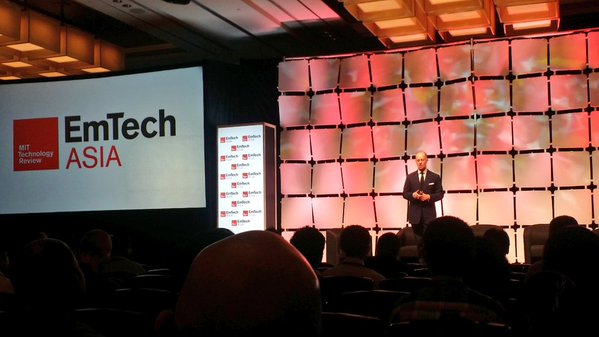MIT Technology Review's EmTechAsia : where technology, business, and culture converge.

MIT Technology Review's EmTechAsia : where technology, business, and culture converge. It’s the showcase for emerging technologies with the greatest potential to change our lives.
More info @ http://www.emtechasia.com/
image credit : @ScienceCentreSG
ps: This content is curated by eChai team from public posts on social media platforms. In case if you have any queries, then email us at [email protected]
Day 2 - Future of Money - Smart Financial Centre, FinTech and Cashless Society
Wondering what the future of money will be? It lies in a Smart Financial Center with a comprehensive ecosystem that harnesses infocomm technology to enable innovation and re-define financial services to increase efficiency, create new opportunities, manage risks better, and improve people’s lives.
Within this framework, FinTech is rapidly enabling innovative technology solutions to be the transformation enablers that drive innovation in financial services.
The future is a cashless society where rapid transformation enabled by smartphones has re-defined the way people live and interact. Convenience, speed, efficiency and inclusiveness of the new digital economy is driving an inevitable cashless future which is secured and seamless.
Sopnendu Mohanty, Chief Fintech Officer, Monetary Authority of Singapore
Day 2 : Biometrics and Cybersecurity Changing Banking as We Know It
Biometrics and cryptography make a great pair to provide multiple levels of security. When these security capabilities are married to transaction options in dynamic permutations, customer service and choices can be expanded beyond the current boundaries of convenience, confidence and trust. In this presentation Tony will take you through some of the latest cybersecurity challenges and innovations the banking industry is facing.
Tony Chew, Regional Head of Information Security, Asia Pacific & Global Head of Cyber Security Regulatory Strategy, Citibank
Day 2 : Democratising Finance - Bitcoin as the Internet of Money
Twenty years ago there was a disruptive upstart technology, with a reputation for being used for crime, that was just opening the doors to mass market commercialization. Today, that technology, the Internet, underpins all global communications, commerce, and information sharing. Today, a new technology is undergoing its own birthing pains as it emerges onto the scene. What will it take for bitcoin and the blockchain to achieve the same global prominence and what will the world look like when we get there? In this talk Justin will explore the similarities and differences in the rise of the Internet and the rise of Bitcoin, and what that may mean for individuals and institutions alike.
Justin Newton, Founder and CEO, Netki
Day 2 : Panel Discussion: Insights from international investment gurus on what and where they are investing
Tech Attracting Smart Money
Panel Discussion: Insights from international investment gurus on what and where they are investing
Moderated by Akiko Fujita, Correspondent, CNBC
Jeff Clavier, Founder and Managing Partner, SoftTech VC
Rob Coneybeer, Managing Director, Shasta Ventures
Justin Kan, Partner, Y Combinator
Yinglan Tan, Venture Partner, Sequoia Capital
Day 2 : Nissan’s Efforts Towards the Socially Acceptable Mass Introduction of Autonomous Cars
Nissan is working to build autonomous cars that inspire trust and engender cooperation - both by occupants and by the surrounding people. To realize this vision it is necessary for self-driving cars to behave in a culturally specific and socially acceptable manner. City driving is a social activity, with ongoing interactions and negotiations between actors. Cars that fail to abide by social conventions at best risk becoming a public nuisance. At worst they inspire unsafe behavior on the part of other road users, impede traffic flow or become stranded at intersections. This talk will describe Nissan’s efforts to overcome these challenges, the underlying technology, as well as other obstacles to realizing the dream promised by the mass introduction of autonomous cars.
Liam Pedersen, Principal Researcher & Manager - Autonomous Vehicles, Nissan Research Center - Silicon Valley
Day 2 : nuTonomy and Self-driving Cars for Mobility-on-Demand
nuTonomy is the start-up tackling the most difficult challenge in self-driving cars -- urban driving. The company is split between Boston and Singapore, with two-thirds of the team based in Singapore where the company is building an R&D fleet of self-driving cars to accelerate technology development. In the future, large fleets of these vehicles providing mobility-on-demand will transform how we think about urban mobility. Such a system has the potential to blur the lines between private and public transportation, and, in the process, transform the existing car ownership paradigm. This talk will discuss some of the challenges that remain to implementing such a system.
Doug Parker, COO, nuTonomy
Day 2 : To Drive or to be Driven? How Self-Driving Vehicles Might Impact the Future of Mobility
Intelligent Transportation
Moderated by Daniel E. Hastings, CEO and Director, Singapore MIT Alliance for Research and Technology (SMART) & Former Chief Scientist, US Air Force
To Drive or to be Driven? How Self-Driving Vehicles Might Impact the Future of Mobility
Although it is still uncertain how fast and how strong self-driving cars will diffuse in the transport system, high impacts on mobility are very much likely in the next decades. Self-driving cars promise increasing safety and energy efficiency, less traffic issues in cities and especially higher comfort for people who don’t want to drive on their own. Nice prospects, but who are the persons benefiting most from autonomous vehicles? And how could those people change their travel behavior in case they don’t drive anymore but are driven by a computer? Will we consequently see a totally different world of transportation in the future?
Peter Phleps, Futurist, Institute for Mobility Research (ifmo) - A research facility of the BMW Group
Day 2 : Meet the Innovators Under 35
Presented by Kathleen D. Kennedy, President, MIT Technology Review
Javier Gomez Fernandez, Assistant Professor, Founder Academic Member, Singapore University of Technology and Design
Grace Leslie, Postdoctoral Fellow, Singapore University of Technology and Design / MIT Media Lab
Madhu Bhaskaran, Senior Lecturer and Co-Leader, Functional Materials and Microsystems Research Group, RMIT University
Siau Chen Chian, Assistant Professor, Department of Civil and Environmental Engineering, National University of Singapore
Day 2 : Cultured Beef: A Marriage of Medical Technology with Food Technology
Cultured Beef: A Marriage of Medical Technology with Food Technology
Meat demand is expected to rise by 70% in the next 35 years due to global population growth and increase in wealth of emerging countries. To ensure food security and to diminish the environmental and animal welfare burden of current livestock beef production, Mark and his team envisioned an alternative by culturing meat from bovine muscle stem cells. In August 2013 they presented the proof of concept by producing, cooking and eating a hamburger from cultured beef. In addition to the process technology, they also started to investigate consumer acceptance by studying what meat means to people and why it is so difficult to become a vegetarian. Will the meaning of meat change if there are ethically superior alternatives? Cultured beef is a multifaceted subject that will provide insight into many fascinating biological and psychological questions. At the same time, we urgently need to find solutions for the upcoming issues with livestock beef production.
Mark Post, Chair of Physiology, Team Lead, Cultured Beef, Maastricht University
Day 2 : The Drinkable Book: Turning the pAge to Produce Clean Water
Theresa invented the first antimicrobial water filter paper: the pAge Drinking Paper. The pAge paper has gained public/media attention in the form of The Drinkable Book™, a collection of these silver nanoparticle-coated filters with water safety tips printed on them in English and the local language. The filters are cheap, lightweight for portability, and require no energy or external inputs. Each pAge filter can purify ~100 L of water: several days of drinking water for a family or several weeks for an individual. The target market for the pAge filters is the “bottom of the pyramid”: the hundreds of millions of people who earn
Day 2 : From Glowing Plants to Oceanic Fields: A Roadmap for Commercializing Plant Synthetic Biology
From Glowing Plants to Oceanic Fields: A Roadmap for Commercializing Plant Synthetic Biology
Synthetic biology has had great success in engineering microbes and now it's starting to realize its potential in more complex organisms like plants. TAXA has more of a software company strategy than a traditional biotech, using open source and rapid agile product development strategies to compete rather than patents and IP. Antony will share details of the technology system, PlantFab1, he built to make the Glowing Plant and the roadmap he hopes will lead to development of plants which can grow on salt water in order to open up the oceans to agriculture and biofuel production.
Antony Evans, Founder & CEO, Glowing Plant & TAXA
Day 2 : Presentation on augmented knowledge by RJ Mical, Director of Games, Google
Presentation on augmented knowledge by RJ Mical, Director of Games, Google
Day 2 : Biofeedback and Gaming: Games That Listen
With the emergence and rising popularity of wearables, it's becoming increasingly clear that we have a fascination with technology that knows more about us than we do. Beyond biofeedback technology’s established foothold in the self-help/health arena (via devices like the FuelBand, FitBit, Apple Watch, etc), it is now also making its way into entertainment via interactive media and video games. In this talk Erin will present the state of biofeedback technology in gaming, the challenges it currently faces, and what the growing influence of biofeedback means for entertainment as a whole in both the immediate and long term future.
Erin Reynolds, Chief Mollusk (Founder, Creative Director), Flying Mollusk
